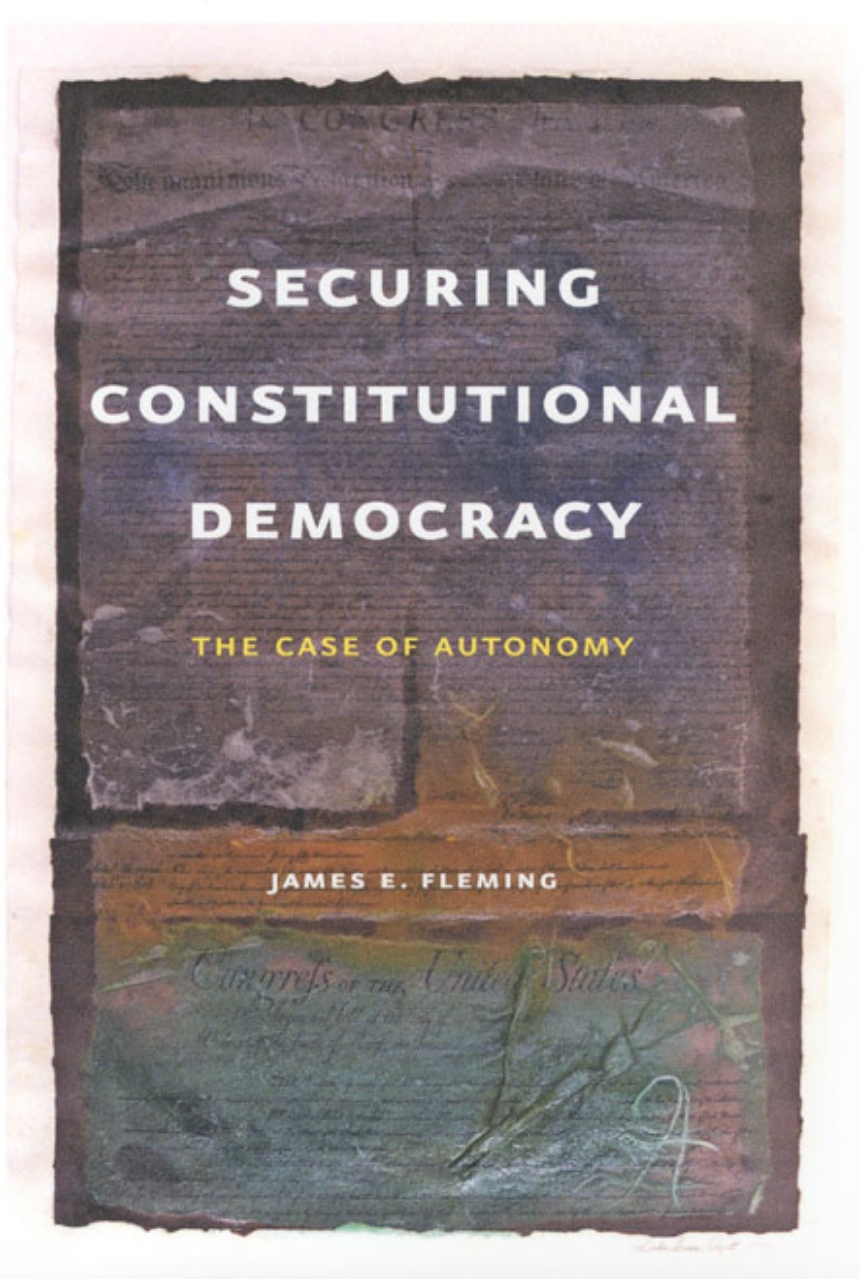Securing Constitutional Democracy
The Case of Autonomy
Famously described by Louis Brandeis as "the most comprehensive of rights" and ’the right most valued by civilized men," the right of privacy or autonomy is more embattled during modern times than any other. Debate over its meaning, scope, and constitutional status is so widespread that it all but defines the post-1960s era of constitutional interpretation. Conservative Robert Bork called it "a loose canon in the law," while feminist Catharine MacKinnon attacked it as the “right of men to be left alone to oppress women.” Can a right with such prominent critics from across the political spectrum be grounded in constitutional law?
In this book, James Fleming responds to these controversies by arguing that the right to privacy or autonomy should be grounded in a theory of securing constitutional democracy. His framework seeks to secure the basic liberties that are preconditions for deliberative democracy—to allow citizens to deliberate about the institutions and policies of their government—as well as deliberative autonomy—to enable citizens to deliberate about the conduct of their own lives. Together, Fleming shows, these two preconditions can afford everyone the status of free and equal citizenship in our morally pluralistic constitutional democracy.
In this book, James Fleming responds to these controversies by arguing that the right to privacy or autonomy should be grounded in a theory of securing constitutional democracy. His framework seeks to secure the basic liberties that are preconditions for deliberative democracy—to allow citizens to deliberate about the institutions and policies of their government—as well as deliberative autonomy—to enable citizens to deliberate about the conduct of their own lives. Together, Fleming shows, these two preconditions can afford everyone the status of free and equal citizenship in our morally pluralistic constitutional democracy.
272 pages | 6 x 9 | © 2006
Law and Legal Studies: General Legal Studies, Law and Society, Legal History, Legal Thought, The Constitution and the Courts
Reviews
Table of Contents
Acknowledgments
1. Securing Constitutional Democracy
Part I. Constructing the Substantive Constitution2. Beyond Process-Perfecting Theories of Reinforcing Representative Democracy
3. Beyond Process-Perfecting Theories of Securing Deliberative Democracy
4. An Outline for a Constitution-Perfecting Theory of Securing Constitutional Democracy
Part II. Securing Deliberative Autonomy Together with Deliberative Democracy
5. Securing Deliberative Autonomy
6. Reconceiving the Due Process Inquiry in Terms of Significance for Deliberative Autonomy: Between Scalia and Charybdis
7. Constitutional Interpretation in Circumstances of Moral Disagreement and Political Conflict
Part III. Adjusting, Preserving, and Perfecting the Scheme of Constitutional Democracy
8. Securing the Family of Basic Liberties as a Whole
9. Securing Constitutional Democracy in War and Crisis
10. Constitutional Imperfections and the Pursuit of Happy Endings: Perfecting Our Imperfect Constitution
Notes
Index
1. Securing Constitutional Democracy
Part I. Constructing the Substantive Constitution2. Beyond Process-Perfecting Theories of Reinforcing Representative Democracy
3. Beyond Process-Perfecting Theories of Securing Deliberative Democracy
4. An Outline for a Constitution-Perfecting Theory of Securing Constitutional Democracy
Part II. Securing Deliberative Autonomy Together with Deliberative Democracy
5. Securing Deliberative Autonomy
6. Reconceiving the Due Process Inquiry in Terms of Significance for Deliberative Autonomy: Between Scalia and Charybdis
7. Constitutional Interpretation in Circumstances of Moral Disagreement and Political Conflict
Part III. Adjusting, Preserving, and Perfecting the Scheme of Constitutional Democracy
8. Securing the Family of Basic Liberties as a Whole
9. Securing Constitutional Democracy in War and Crisis
10. Constitutional Imperfections and the Pursuit of Happy Endings: Perfecting Our Imperfect Constitution
Notes
Index
